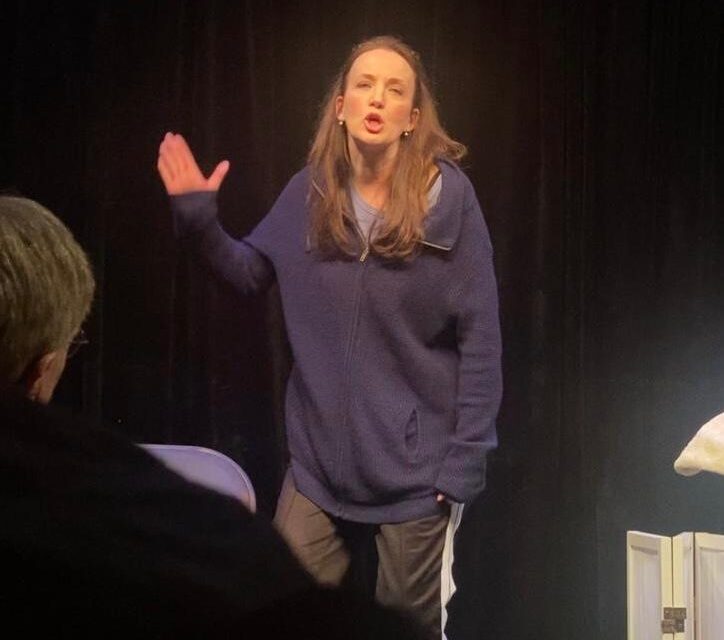By Walter Murphy
I arrived at the An Beal Bocht Cafe ready to review Eileen Byrne Richards’ one-woman performance of Running with Coffee only to realize I was attending a family reunion—shockingly, my family reunion.
The hour-long performance—written and performed by Ms. Richards and presented by the Poor Mouth Theater Company, part of the Origin 1st Irish Festival—is set in Chicago, with most of the remembrances occurring in Queens (New York) in the 1970s. A branch of my family tree resided there—the Queens Murphys (as opposed to the New Jersey Murphys or the Cincinnati Murphys—we are not terribly clever at naming things). So, Ms. Richards’ detailed and insightful recounting of her family history reminded me so much of my uniquely Irish Catholic upbringing. And it was a tale that touched the heart with sadness, regret, and guilt, as only the Irish can pull off, and which was well done here.

Sue Landry finds herself overwhelmed, caring for her mother and father in addition to her own three kids and husband: “I don’t really know who I’m supposed to be anymore.” Her older sister is an occasional caregiver when not traveling the world as a flight attendant.
The story recounts how Sue got to the point where she was the caregiver to her folks. Her mother has dementia and her father, at 96, doesn’t walk well and possibly drinks too much. “So it’s hard to know what’s the right thing to do when you become a parent to your parents.” Add to that frustration the fact that her parents only recently returned to her life after a 36-year separation. What?? As she laments, “Just when I think I’m out, they pull me back.”
She recalled her typically Irish Catholic upbringing, which featured the belief that there’s nothing ever wrong and that God will find a way. Things will always work out. Unfortunately, that belief is undercut with crushing guilt and self-doubt. For a woman or a young girl in the 1970s, the Catholic Church was (and still is) paternalistic and unsupportive. For example, Sue was a child of Catholic Divorce. For the uninitiated, Catholics who marry and have children cannot have their marriage annulled in the church: if there was no marriage, the children become illegitimate. Oh, the shame! Catholics never get a celestial break. They are even born with original sin—thanks Adam and Eve!


Ms. Richards assumed the five characters in her personal orbit, shifting quickly into each. She portrayed the different characters by deftly switching accents. And she does so masterfully. I really enjoyed her distinctive, Queens accent: “coorefee” (coffee) and “core-tas” (quarters). I could hear my Queens cousin speaking thusly. That realization led me to think about how the audience received the performance, and whether one could recognize that world (as I did) or learn and experience Sue’s life as a performance. Said another way, did one need to be Irish Catholic from New Yawk to appreciate the performance? I think not. The performance stood on its own merits as a tale well told.
Given that the performance is based on the playwright’s life, I disagree with Sue Landry’s belief that “. . . writing is another form of mental illness.” On the contrary, writing the performance must have been cathartic due to the depths to which the playwright examined her experiences, especially the lessons she learned about co-dependency while growing up. By the end of the performance, her character realizes that she needs help.


It should be noted that the theater of the An Beal Bocht Cafe is a separate room of the cafe, sharing a wall and, I think, a curtained separator with the lively pub of its same name. At Saturday’s performance, Ms. Richards showed extraordinary focus and concentration when performing despite the noise from the pub. (The Manhattan College lacrosse team was boisterously celebrating its winning the MAAC championship in the next room.) I found the noise a distraction which Ms Richards gracefully rose above.
Running with Coffee’s last performance as part of the Origin 1st Irish Festival was Sunday, April 28th.


















